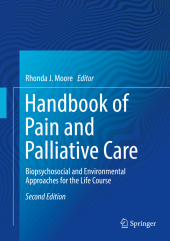 Neuerscheinungen 2019Stand: 2020-02-01 |
Schnellsuche
ISBN/Stichwort/Autor
|
Herderstraße 10
10625 Berlin
Tel.: 030 315 714 16
Fax 030 315 714 14
info@buchspektrum.de |

Rhonda J. Moore
Handbook of Pain and Palliative Care
Biopsychosocial and Environmental Approaches for the Life Course
Herausgegeben von Moore, Rhonda J.
2. Aufl. 2019. xxxvii, 902 S. 26 SW-Abb., 58 Farbabb. 254 mm
Verlag/Jahr: SPRINGER, BERLIN; SPRINGER INTERNATIONAL PUBLISHING 2019
ISBN: 3-319-95368-0 (3319953680)
Neue ISBN: 978-3-319-95368-7 (9783319953687)
Preis und Lieferzeit: Bitte klicken
This comprehensive revision of the invaluable reference presents a rigorous survey of pain and palliative care phenomena across the lifespan and across disciplines. Grounded in the biopsychosocial viewpoint of its predecessor, it offers up-to-date understanding of assessments and interventions for pain, the communication of pain, common pain conditions and their mechanisms, and research and policy issues. In keeping with the current public attention to painkiller use and misuse, contributors discuss a full range of pharmacological and non-pharmacological approaches to pain relief and management. And palliative care is given expanded coverage, with chapters on interventive, ethical, and spiritual concerns.
ú Pain, intercultural communication, and narrative medicine.
ú Assessment of pain: tools, challenges, and special populations.
ú Persistent pain in the older adult: practical considerations for evaluation and management.
ú Acute to chronic pain: transition in the post-surgical patient.
ú Evidence-based pharmacotherapy of chronic pain.
ú Complementary and integrative health in chronic pain and palliative care.
ú The patient´s perspective of chronic pain.
ú Disparities in pain and pain care.
This mix of evolving and emerging topics makes the Second Edition of the Handbook of Pain and Palliative Care a necessity for health practitioners specializing in pain management or palliative care, clinical and health psychologists, public health professionals, and clinicians and administrators in long-term care and hospice.
Biopsychosocial approaches to understanding chronic pain and disability.- Communication and Pain .- Pain and intercultural communication.- Truth telling and palliative care.- Communiatona nd palliative care: e-health interventions and pain management.- Educating patients and caregivers about pain management: what clinicians need to know.- Assessment of Pain .- Pain assessment tools in palliative cancer care.- Quality indicators for pain in palliative care.- Palliative care clinical trials: generalizability and applicability in hospice and palliative care practice.- Dynamic pain assessment: an application of clinical infometrics in personalized pain treatment and management.- Assessing pain and unmet need in patients with advanced dementia: the role of the serial trial intervention.- Common Pain Conditions .- Pediatric chronic pain.- Pain in the older person.- Pain after traumatic brain injury.- Pain in the battlefield injured.- Pain, whiplash disorder, and traffic safety.- Chronic low back pain.- Adult cancer-related pain.- Mechanisms of Pain .- Neuroanatomy of pain and pain pathways.- Acute to chronic pain: transition in the post-surgical patient.- Pain and the placebo/nocebo effect.- Sex differences in pain across the life course.- Stress and pain.- Hope in the context of pain and palliative care.- Temporomandibular disorder and its relationship with fibromyalgia.- Phantom limb pain.- Pharmacogenetics of pain: the future of personalized medicine.- Pain imaging.- Interventions for Pain .- Evidence-based pharmacotherapy of chronic pain.- Chronic pain and opioids.- Nerve blocks, trigger points, and intrathecal therapy for chronic pain.- Neurosurgical interventions for the control of chronic pain conditions.- Rehabilitation treatments for chronic musculoskeletal pain.- Psychosocial, Complementary and Alternative, and Spiritual Approaches for the Control of Symptoms .- Pain, depression, and anxiety in cancer.- Support groups for chronic pain.- CAM in chronic pain and palliative care.- Spiritual dimensions of pain and suffering.- Perspectives on Pain from the Humanities and Social Sciences .- Suffering, hope, and healing.- Narrative and pain: towards an integrative model.- Representations of the body in pain: anthropological approaches.- The art of pain: the patient´s perspective of chronic pain.- Ethical Issues and Future Directions .- Disparities in pain management and palliative care.- The delineation and explication of palliative options of last resort.- Recognition and resolution of ethical barriers to palliative care research.- How health care reform can improve access to quality pain and palliative care services.


